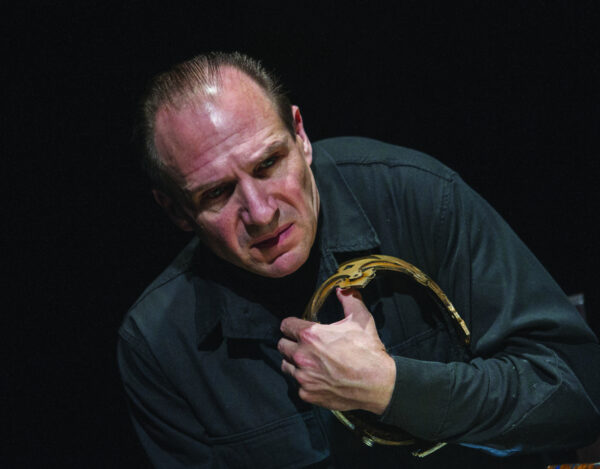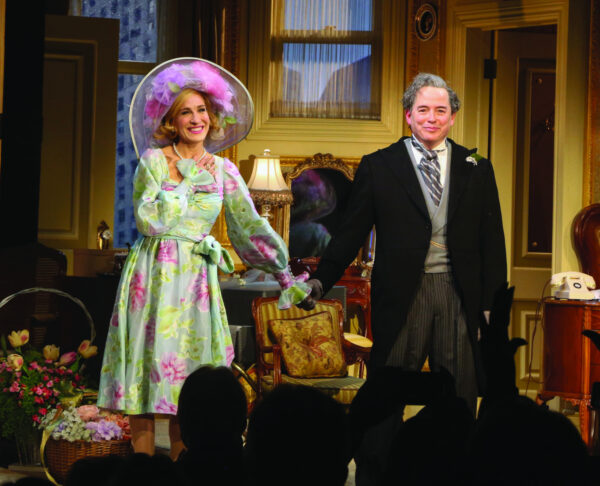Britannia Rules The Stage!
Richard Darbourne takes a front-row seat as our vibrant theatre scene triumphs over pandemic mayhem to thrill audiences once again
By Richard Darbourne
April 11 2025
Global pandemics offer few positives, but if any silver linings are to be found, one would be the affirmation of our need to share live experiences. Back in 2020, as our digital life was expanding at a rapid pace, there was speculation of what this meant for our stages. As more and more shows were broadcast online, would this lead to a permanent drop in audience numbers? Admittedly, the whole ecosystem has taken time to recover and there remain many challenges, but audiences are back and embracing new content. Plus, they are being treated to a rich array of international talent, ranging from home-grown new musicals to Japanese surprise mega-hits and Hollywood sparkle. Movie stars, it seems, are also craving that shared, live experience and their enthusiasm is to our gain. This year, established actors treading the boards included Ian McKellen, complete in fat suit; Ralph Fiennes; Mark Rylance; Brian Cox; Sheridan Smith; and David Tennant, who were joined by the likes of Sarah Jessica Parker, Tom Holland and Sarah Snook. And hats off to McKellen and Fiennes, who recognise the importance of getting great plays out of the capital and visiting Manchester, Liverpool and beyond.

Musicals also offer an exciting scene of new British writing not seen in years. Yes, big imports do still travel across the pond (notably MJ: the Musical) but Operation Mincement follows the smash hit Six in recent award acclaim. Other gems include Little Big Things; Kathy and Stella Solve a Murder; Two Strangers (Carry a Cake Across New York) and the sumptuously epic, foot-stomping love story, The Curious Case of Benjamin Button opening in the West End this autumn. All are homegrown, built, baked, and financed in the UK and leaning our audiences to turn excitedly to what’s new rather than settle with the tried-and tested revival titles. Of course, Anything Goes, Kiss Me Kate and Guys and Dolls at the Bridge show the classics still have their place, but new British musicals are opening, sticking around and often looking to transfer to Broadway, whereas it has always been the other way around up to now. Digital marketing is a key driver. The power of Meta and Tik Tok mean marketing teams are reaching audiences faster and better than ever before. Challenges still remain, however. The pandemic offered an opportunity for the industry to appraise its working practices.
In a nutshell, the overarching mantra of ‘the show must go on’ is no longer the modus operandi. Skilled backstage crew (sound technicians, stage managers, wardrobe assistants, and dressers) who had previously accepted long hours with few days off, working to tight deadlines and even tighter budgets, are harder to find and more expensive when you find them. Increased labour costs; higher head count on shows; higher theatre costs; inflated fuel and trucking costs; the cost of physical materials, including props and costumes, mean the budget for operating a show each week is 20% greater than in 2019. Alongside an increase in the number of shows being cancelled due to illness, coupled with inflation, this means profit margins are squeezed. And yet, more shows than ever are queuing up to be programmed!

Well, hang it all. We were never in it for the money, anyway! That continues to be the message for the investor. One would always say theatre is a way to spend money rather than make money, but dig deeper and theatre investment is not quite the roulette casino it is often thought to be. Typically, plays require some £700,000 to £1 million of upfront capital to be staged. They then run at around £80,000–£120,000 net per week to cover their operating costs. Most plays tend to have a fixed run (though some run on and on, like The Play That Goes Wrong) and the mathematics is to amortise your upfront costs over however many weeks you are playing for, add that to your weekly operating figure, and that is the figure you have to net each week in order to ‘recoup’. And you pay your weekly royalties on top of that figure first.
The media is keen to spot a high ticket price, which doesn’t tell the full story. In the case of Plaza Suite at The Savoy Theatre, 22% of the house was sold each night at a premium and these were the tickets the customer saw if trying to book on the week of a high-demand show. But 78% of all tickets were sold under £90 and 33% sold under £55. A Streetcar Named Desire gave a performance entirely free of charge to first-time theatregoers. The average ticket price across the West End is £56, net of taxes. And after taxes, theatre costs, and commissions, around 50% of what leaves the customer’s purse lands with the production. All that said, a vital shot in the arm that helps all of the above is the theatre tax credit. Rightly, the Government has been acknowledged for incentivising investment in live entertainment (theatre, music, dance, opera) with huge benefits for the entire ecosystem, from technical suppliers, set builders, and costume makers to the hotels, bars, and restaurants frequented by the 18 million London theatre-goers last year. The Exchequer agreeing to keep the tax credit above 40% and more for touring shows is a powerful nod to the arts and our place as a global leader of theatrical entertainment.

Investment largely comes from other producers or production companies. That’s why you often see a slew of names above a title on the board outside a theatre. There are still a few private individuals who invest as ‘angels’, though they more than likely have set up a limited company to do so. And what are they getting for their money? World-leading entertainment, for one thing. It used to be Stoppard and Ayckbourn (possibly Frayn) who could sell a play based on their name alone. Now, a good play is a good play and the power of digital word of mouth means news travels fast. Non-star-led plays are regularly transferring from the subsidised sector to the West End, including Oslo, Ink and Consent, which thrilled their audiences, while works by writers including James Graham, Lucy Prebble, Laura Wade, Duncan MacMillan, and Jez Butterworth became cultural events, particularly the latter’s Jerusalem and The Ferryman. His latest work, The Hills of California, was booked into the West End before the final draft had even been inked.

Broadway transfers are common, with The Lehman Triology leading the pack — an astonishing achievement by the National Theatre to distil a nine-hour play written first in Italian into a three-hour masterpiece with three actors captivating 9,000 people every week in sold-out theatres for multiple runs. British theatre is both world-class and a significant contributor to the UK economy in terms of GDP, contributions to the tourism industry, and direct and indirect employment. It also provides excellent returns for investors as well as a lot of fun and inspiration. Overall, London’s position as one of the greatest cities on Earth undoubtedly owes much of its reputation to cutting-edge theatre productions. Whether they be cackling green Witches; Six rapping Tudor queens; or a writhing Cabaret gyrating you into 1930s Berlin, the West End is a bright light of Britain’s economy for 2024 and beyond.
Coming up at Boisdale
Discover what's going on across our famous venues
NYE with FiL Straughan & Mi-Soul DJ's
Canary Wharf
31 December 2025
Welcome 2026 with FiL Straughan and Mi-Soul DJs at Boisdale of Canary Wharf. A night of refined dining, soulful performance and classic R&B, followed by a DJ after-party that runs until 3am. The capital’s definitive setting for a full New Year’s Eve experience.
The Wonder of Stevie
Canary Wharf
2 January 2026
A vibrant celebration of Stevie Wonder’s lifetime of genius, led by mesmeric vocalist Noel McCalla and award-winning saxophonist Derek Nash, performing the landmark songs that shaped soul, funk and Motown across generations.
Cuban All Stars present the Buena Vista
Canary Wharf
7 January 2026
London’s leading Latin musicians, led by Sambroso Noda, bring the spirit of Havana to life with a powerful celebration of Buena Vista Social Club and Cuba’s greatest musical legends. Expect irresistible rhythms, rich percussion and a night of authentic Cuban soul.
DJ Luck & MC Neat
The Hine Bar
29 January 2026
DJ Luck & MC Neat bring the sound of UK Garage to Boisdale of Canary Wharf, with rolling 2-step beats, soulful hooks and lyrical flow that shaped the scene. Hosted by resident DJ Lola So, the night celebrates the groove and spirit of London’s golden era of club culture.
Artful Dodger
The Hine Bar
26 February 2026
The pioneers of UK Garage, Artful Dodger, burst onto the scene in the late ’90s with hits like “Re-Rewind” and “Movin’ Too Fast”. Hosted by Lola So, they return to bring the dancefloor alive with a night of classic House and Garage anthems at Boisdale of Canary Wharf.
Boney M
Canary Wharf
6 March 2026
Founding member Maizie Williams brings the iconic sound of Boney M to Boisdale with a night of pure disco nostalgia, featuring classics like “Rivers of Babylon”, “Daddy Cool” and “Rasputin”. A rare chance to experience one of pop’s most enduring acts up close.
